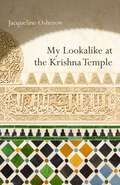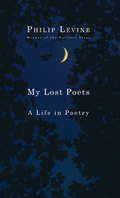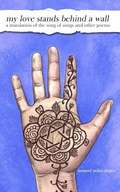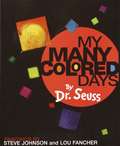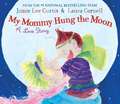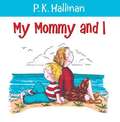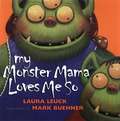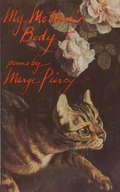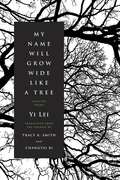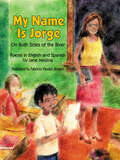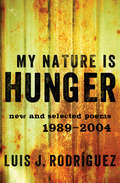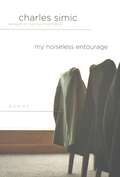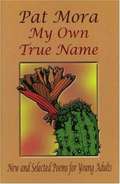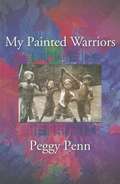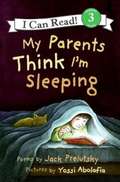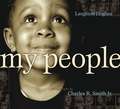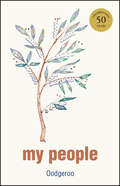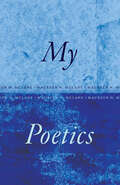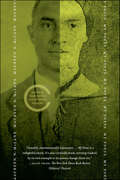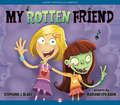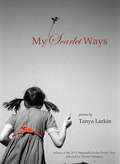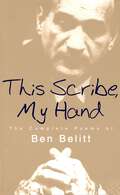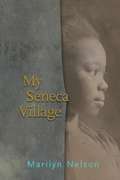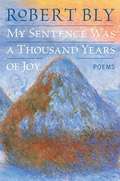- Table View
- List View
My Lookalike at the Krishna Temple: Poems
by Jacqueline OsherowIn My Lookalike at the Krishna Temple, Jacqueline Osherow considers expressions of spirituality from cultures all over the world and investigates previously unexplored aspects of her relationship to Judaism and Jewish history. While some poems reflect on practitioners of self-imposed isolation, from the monks in Fra Angelico’s frescoed cells to Emily Dickinson to the Kotzker Rebbe, others explore topics as varied as architecture, geometry, faith, war, and genocide. Osherow finds beauty in Joseph’s dreams, the euphony of crickets, and the gamut of symmetries on display in the Alhambra. The scent of lindens serves as a meditative bridge between Darmstadt, Germany, alien and unnerving, and a familiar front porch in Salt Lake City, where the poet freely engages with the natural world: “Don’t worry, moon; we all lose our bearings. / You don’t have to rise. Stay here instead. / I’ll spot you; we could both use an ally / and rumor has it disorientation / is the least resistant pathway to what’s holy.” Osherow takes readers on a journey as tourists and global citizens, trying to find meaning in an often painful and chaotic world.
My Lost Poets: A Life in Poetry
by Philip LevineEssays, speeches, and journal entries from one of our most admired and best-loved poets that illuminate how he came to understand himself as a poet, the events and people that he wrote about, and the older poets who influenced him. In prose both as superbly rendered as his poetry and as down-to-earth and easy as speaking, Levine reveals the things that made him the poet he became. In the title essay, originally the final speech of his poet laureate year, he recounts how as a boy he composed little speeches walking in the night woods near his house and how he later realized these were his first poems. He wittily takes on the poets he studied with in the Iowa Writing Program: John Berryman, who was his great teacher and lifelong friend, and Robert Lowell, who was neither. His deepest influences--jazz, Spain, the working people of Detroit--are reflected in many of the pieces. There are essays on Spanish poets he admires, William Carlos Williams, Wordsworth, Keats, and others. A wonderful, moving collection of writings that add to our knowledge and appreciation of Philip Levine--both the man and the poet.From the Hardcover edition.
My Love Stands Behind A Wall: A Translation of the Song of Songs and Other Poems
by Netanel Miles-YepezThe Song of Songs (Shir HaShirm) is among the most beloved books of the Hebrew Bible, beloved both for the beauty of its language and for the mystical ideas it has inspired. However, many new readers may be surprised to learn that-while it is often understood as an allegory for the relationship between God (the Bridegroom) and humanity (the Bride)-it has no explicit religious content whatsoever and actually seems to celebrate erotic love. In this new translation, Netanel Miles-Yépez, attempts to emphasize the "earthy immediacy" of the original Hebrew, wishing the Song of Songs to stand on its own as "love poetry," arguing that the mystical poetry and insights about Divine Love it has inspired actually come from an engagement with the raw imagery of human love. Also included are translations of the mystical poetry of Juan de la Cruz, Elazar Azikri, and Shlomo Halevi Alakabetz from the Spanish and Hebrew.
My Many Colored Days
by Dr SeussHere is a completely new and different kind of book by Dr. Seuss using a spectrum of colors, a menagerie of animals and his familiar bouncing rhyme. Dr. Seuss wrote this book about feelings and moods in 1973. He stated in a letter that he hoped "a great color artist who will not be dominated by me" could be found to illustrate the manuscript, one who might bring a "new art style and pattern of thinking" to his words. At last his text has found the perfect compliment in the stunning expressive paintings of Steve Johnson and Lou Fancher. With the playful type design, here is one beautiful book, bubbling with the kind of fun and emotional truth that is bound to appeal to very young children as well as to Dr. Seuss fans of all ages.
My Mommy Hung the Moon: A Love Story
by Jamie Lee CurtisMy mommy hung the moon. She tied it with string. My mommy's good at EVERYTHING. The ninth children's book by the #1 New York Times bestselling team of Jamie Lee Curtis and Laura Cornell is a celebration of unconditional love between mother and child. Mommy is the best at everything: Not only does she carpool, untangle kites, steal bases, and bake cookies, she also seems to light up the sun with her love. Written straight from the heart and illustrated with tender hilarity, My Mommy Hung the Moon: A Love Story is a keepsake that defines the magical relationship a mother has with her son or daughter. So grab the little one you love, and rejoice as the ordinary moments of everyday life become extraordinary because of the magic of mother love.
My Mommy and I
by P. K. HallinanThis book is for ages 3-5. This is a PK Hallinan story that illustrates the loyalty and love that grows between a mother and her children. Whimsical illustrations bring the characters to life in this gentle world Hallinan has created.
My Monster Mama Loves Me So
by Laura LeuckMy monster mama loves me so! Let me tell you how I know. When I wake up, she tweaks my nose, tickles all my pointy toes, combs the cobwebs from my bangs, and makes sure that I brush my fangs. At once tender and funny, this monster bedtime story is guaranteed to generate giggles, tickles, and plenty of monster hugs.
My Mother's Body
by Marge PiercyMy Mother's Body, Marge Piercy's tenth book of poetry, takes its title from one of her strongest and most moving poems, the climax of a powerful sequence of Poems to her mother. Rooted in an honest, harrowing, but ally ecstatic confrontation of the mother / daughter relationship in all its complexity and intimacy, it is at the same time an affirmation of continuity and identification."The Chuppah" comprises poems actually used in her wedding ceremony with Ira Wood. This section sings with powerfully female love poetry. There is also a sustained and direct use of her Jewish identity and faith in these poems, as there is in a number of other poems throughout the volume.Readers of Piercy's previous collections will not be surprised to encounter her mixture of the personal and the political, her love of animals and the Cape landscape. There are poems about doing housework, about accidents, about dreaming, about bag ladies, about luggage, about children's fears of nuclear holocaust; about tomcats, insects in the rafters, the influence of a name, appleblossoms and blackberries, pollution, and some of the ways women objectify one another. In "Does the light fail us, or do we fail the light?" Piercy writes with lacerating honesty about our relationships with the elderly and about hers with her father.Some of the most moving poems are domestic, as in the final sequence, "Six underrated pleasures," which finds in daily women's tasks both pleasure and mystery, affirmation of serf and connection with the mother.In all, My Mother's Body is one of Piercy's most powerful and balanced collections.
My Name Will Grow Wide Like a Tree: Selected Poems
by Yi LeiOne of China’s most significant contemporary poets, co-translated by former US Poet Laureate Tracy K. Smith*Shortlisted for the 2021 Griffin Poetry Prize*Yi Lei published her poem “A Single Woman’s Bedroom” in 1987, when cohabitation before marriage was a punishable crime in China. She was met with major critical acclaim—and with outrage—for her frank embrace of women’s erotic desire and her unabashed critique of oppressive law. Over the span of her revolutionary career, Yi Lei became one of the most influential figures in contemporary Chinese poetry.Passionate, rigorous, and inimitable, the poems in My Name Will Grow Wide Like a Tree celebrate the joys of the body, ponder the miracle of compassion, and proclaim an abiding reverence for the natural world. Presented in the original Chinese alongside English translations by Changtai Bi and Pulitzer Prize–winning poet Tracy K. Smith, this collection introduces American readers to a boundless spirit—one “composing an explosion.”
My Name is Jorge: On Both Sides of the River
by Jane MedinaJorge is trying to learn the ways of his new country. He wants to fit in at school, but he doesn't want to forget his homeland, Mexico. His family is still doing things like they're in the old country, but Jorge wants to find out everything he can about his new country--on the other side of the river. Learning a new language, getting a library card, taking tests, and making friends are challenges for Jorge. Just when Jorge has found a friend in Tim, his life changes once again. Told from the point of view of Jorge, Jane Medina's moving poems vividly depict one boy's struggle to make a new life in a new country.
My Nature Is Hunger: New and Selected Poems: 1989–2004
by Luis J. RodríguezThe collected poems of one of America&’s foremost balladeers of urban struggle and immigrant dreams Over his three-decade career as a poet, novelist, and memoirist, Luis J. Rodríguez has earned acclaim for his remarkable ear for the voices of the city. My Nature Is Hunger represents the best of his lyrical work during his most prolific period as a poet, a time when he carefully documented the rarely heard voices of immigrants and the poor living on society&’s margins. For Rodríguez&’s subjects, the city is all-consuming, devouring lives, hopes, and the dreams of its citizens even as it flourishes with possibility. &“Out of my severed body / the world has bloomed,&” and out of Rodríguez&’s stirring vision, so has beauty. This ebook features an illustrated biography of Luis J. Rodríguez including rare images from the author&’s personal collection.
My Noiseless Entourage: Poems
by Charles SimicThis collection of poems from Charles Simic demonstrates once again his wit, moral acuity, and brilliant use of imagery. His settings are a farmhouse porch, a used-clothing store, empty station platforms; his subjects love, futility, and the sense of an individual life lived among a crowd of literal and imaginary presences. Both sharp and sympathetic, the poems of this collection confirm Simic's place as one of the most important and appealing poets of our time. To Dreams I'm still living at all the old addresses, Wearing dark glasses even indoors, On the hush-hush sharing my bed With phantoms, visiting in the kitchen After midnight to check the faucet. I'm late for school, and when I get there No one seems to recognize me. I sit disowned, sequestered and withdrawn. These small shops open only at night Where I make my unobtrusive purchases, These back-door movie houses in seedy neighborhoods Still showing grainy films of my life, The hero always full of extravagant hope Losing it all in the end?-whatever it was- Then walking out into the cold, disbelieving light Waiting close-lipped at the exit.
My Own True Name: New and Selected Poems for Young Adults, 1984-1999
by Pat MoraMore than sixty poems, some with Spanish translations, include such titles as "The Young Sor Juana," "Graduation Morning," "Border Town 1938," "Legal Alien," "Abuelita Magic," and "In the Blood."
My Painted Warriors
by Peggy PennPenn probes the character of enduring love and the frailty of human life. These poems are a celebration of ritual and the passage of time. "Penn's subject is age: winter and funerals, yes, but also brassieres, orgasms after sixty, flourishing gardens, and four boys, her painted warriors. The images of these poems, both tender and bright, are as surprising as the sudden ruby of blood from a cut. Their sensibility is as understanding of humanity as any reader could hope for. Penn encases the double helix of love and loss in the ordinary, whether that is a cantaloupe or the hair on a wrist. Worlds into worlds open up in My Painted Warriors, transforming this book of poems into a collection of miracles. It is the kind of poetry I can turn to when I wake in the night, the voice of both a fellow companion and a sagacious guide. " Molly Peacock
My Parents Think I'm Sleeping (I Can Read! #Level 3)
by Jack PrelutskyThese 16 rollicking rhymes show young readers that a child's life begins at bedtime. Ages 4-8 So my parents think I'm sleeping, but that's simply their mistake, I have got them fooled completely, I am really wide-awake. From watching shadows dancing on a wall, to reading books by flashlight under the covers, to sneaking downstairs to grab that last piece of chocolate cake, master poet Jack Prelutsky shows readers that a child's life begins at bedtime!
My People
by Langston HughesLangston Hughes's spare yet eloquent tribute to his people has been cherished for generations. Langston Hughes (1902-1967) is one of America's most beloved and cherished chroniclers of the black experience. Best known for his work during the Harlem Renaissance, Hughes's work was consistently groundbreaking throughout his forty-six year career.
My People
by OodgerooImmerse yourself in the poetry of one of Australia’s foremost Indigenous artists My People is a compilation of the poetry of Oodgeroo, of the tribe Noonuccal, Custodian of the land Minjerribah. This collection of captivating poetry detailing the struggle of Australia’s Indigenous peoples is more relevant today than ever before. While she passed away in 1993, Oodgeroo remains one of Australia’s most influential Aboriginal poets. Her poetry leaves little room to argue why that shouldn’t be the case. Razor-sharp and incisive, while simultaneously haunting and beautiful, Oodgeroo’s poems will enchant both young and old alike. My People is a bewitching collection of Oodgeroo’s poems that belongs on the bookshelves of every art lover and anyone with an appreciation of the written word.
My Poetics
by Maureen N. McLaneAcclaimed poet and critic Maureen N. McLane offers an experimental work of criticism ranging across Romantic and contemporary poetry. In My Poetics, Maureen N. McLane writes as a poet, critic, theorist, and scholar—but above all as an impassioned reader. Written in an innovative, conversable style, McLane’s essays illuminate her own poetics and suggest more generally all that poetics can encompass. Ranging widely from romantic-era odes and hymns to anonymous ballads to haikus and haibuns to modernist and contemporary poetries in English, My Poetics explores poems as speculative instruments and as ways of registering our very sense of being alive. McLane pursues a number of open questions: How do poems generate modes for thinking? How does rhyme help us measure out thought? What is the relation of poetry to its surroundings, and how do specific poems activate that relation? If, as Wallace Stevens wrote, “poetry is the scholar’s art,” My Poetics flies under a slightly different banner: study and criticism are also the poet’s art. Punctuated with McLane’s poems and drawing variously on Hannah Arendt, Percy Bysshe Shelley, Roland Barthes, Bruno Latour, and other writers and poets, My Poetics is a formally as well as intellectually adventurous work. Its artful arrangement of readings and divagations shows us a way to be with poems and poetics.
My Poets
by Maureen N. McLaneA thrillingly original exploration of a life lived under poetry's uniquely seductive spell"Oh! there are spirits of the air," wrote Percy Bysshe Shelley. In this stunningly original book Maureen N. McLane channels the spirits and voices that make up the music in one poet's mind. Weaving criticism and memoir, My Poets explores a life reading and a life read. McLane invokes in My Poets not necessarily the best poets, nor the most important poets (whoever these might be), but those writers who, in possessing her, made her. "I am marking here what most marked me," she writes. Ranging from Chaucer to H.D. to William Carlos Williams to Louise Glück to Shelley (among others), McLane tracks the "growth of a poet's mind," as Wordsworth put it in The Prelude. In a poetical prose both probing and incantatory, McLane has written a radical book of experimental criticism. Susan Sontag called for an "erotics of interpretation": this is it. Part Bildung, part dithyramb, part exegesis, My Poets extends an implicit invitation to you, dear reader, to consider who your "my poets," or "my novelists," or "my filmmakers," or "my pop stars," might be.
My Rotten Friend
by Stephanie J. Blake Mariano EpelbaumPenelope is a little different. She might also be a little . . . undead. After biting some teachers, Penelope gets sent home from school--and that's when things go from bad to worse! What would you do if your best friend turned out to be a zombie? This hilarious tale is perfect for anyone who thinks the B in BFF should stand for BRAINS.
My Saw
by Kimberly WeinbergerWith vibrant artwork and rhyming text. this durable board book provides the perfect way to introduce preschoolers to the exciting world of tools!
My Scarlet Ways
by Tanya LarkinThe poems in My Scarlet Ways are, most often, attempts at self-destruction by any means necessary--love, sex, language, God, and ultimately, fantasies of motherhood. With piercing passion and linguistic precision, Tanya Larkin, pursues and retreats from her reader like a poetic Mata Hari, drawing us closer, if only to entice and strike us again in poem after poem. As judge, Denise Duhamel writes, "Larkin is a poet of intelligence and intuition, of wily and wicked wisdom." My Scarlet Ways is a new and unique addition to American poetry.
My Scribe, My Hand: The Complete Poems Of Ben Belitt (Poetry Series)
by Ben BelittThis volume brings together a lifetime's achievement by one of America's outstanding poets of the twentieth century. Though his earliest poems were published more than sixty years ago, Ben Belitt's works in sum are likely to strike readers today with the force of unprecedented encounter. A poet of abundance and sometimes carnivalesque riotousness, Belitt also calls to mind the intensity and eruptiveness of Hopkins, the double passion for the infinite and the empirical exemplified by Neruda, and the lustrous word-painting associated with Keatsian Romanticism. But as these diverse predecessors suggest, Belitt is altogether an original, whose derivation is as multiple as his figuration. His concerns range from the appalled enthrallment with violence and disorder to the rage to learn how one can live in chance and confront the mandates of mortality.
My Seneca Village
by Marilyn NelsonThis beautifully crafted and powerful collection of poems deals with a brief period (1825–57) in New York City's storied past. Seneca Village, on Manhattan's Upper West Side, was a thriving multiethnic community of African Americans, Irish and German immigrants, and, possibly, some Native Americans, until it was decimated by the creation of Central Park.<P><P>After poring over the written accounts and census records, renowned poet Nelson sat down to imagine the lives of a number of the residents, giving voice to individuals based on the names and identifying labels. Brief paragraphs set each scene, followed by a poem in the voice of the Seneca Villager. Readers hear from a bootblack, a conjure-man, a reverend, a hairdresser, a nurse, a mariner, schoolchildren, a music teacher, tub-men hauling sewage to the river, an elderly conductor on the Underground Railroad, and abolitionist and activist Maria W. Stewart. As in any impoverished community, the hardships are palpable—babies die of misunderstood diseases, people are victimized by their starving neighbors, there's violence and cruelty—but there is also resilience, hard-won independence, and hope for its children's futures. In the spirit of Edgar Lee Masters's Spoon River Anthology, this work touches on historical truths (footnoted throughout) but introduces a fleeting time and place through the everyday hopes and dreams of its residents. VERDICT This rich and diverse (a variety of poetic forms, including ones invented for certain speakers, are featured) piece of American literature belongs in every collection.
My Sentence Was a Thousand Years of Joy
by Robert BlyA fresh, new volume by one of the premier living American poets Readers have found Robert Bly's ghazals startling and new; they merge wildness with a beautiful formality. The ghazal form is well known in Islamic culture but is only now making its way into the literary culture of the West. Each stanza of three lines amounts to a finished poem. "God crouches at night over a single pistachio. / The vastness of the Wind River Range in Wyoming / Has no more grandeur than the waist of a child." The ghazal's compacted energy is astounding. In a period when much American poetry is retreating into prosaic recordings of daily events, these poems do the opposite. My Sentence Was a Thousand Years of Joy is Robert Bly's second book of ghazals. The poems have become more intricate and personal than they were in The Night Abraham Called to the Stars, and the leaps even more bold. This book includes the already famous poem against the Iraq War "Call and Answer": "Tell me why it is we don't lift our voices these days / And cry over what is happening. Have you noticed / The plans are made for Iraq and the ice cap is melting?" The poems are intimate and yet reach out toward the world: the paintings of Robert Motherwell, the intensity of flamenco singers, the sadness of the gnostics, the delight of high spirits and wit. Robert Bly is writing the best poems of his life, and this book reestablishes his position as one of the greatest poets of our era.
